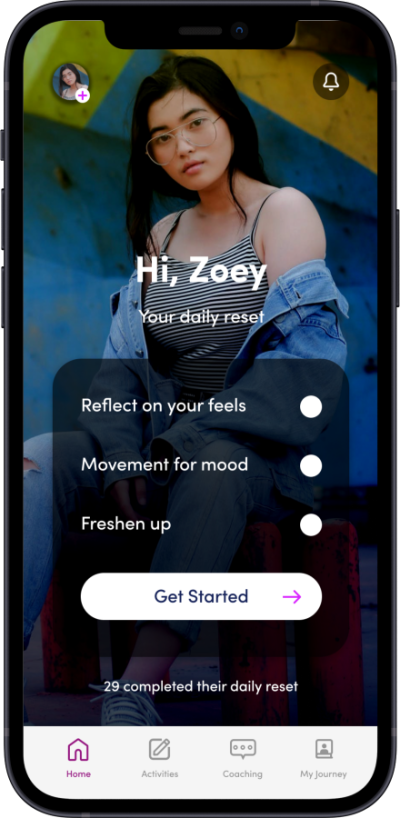In order to address deteriorating adolescent mental health, interventional behavioral health app BeMe Health moved to meet teens where they’re at—online. And, according to new research, this methodology is proving successful.
In conjunction with Stanford University, BeMe recorded the engagement and outcomes of roughly 13,000 users, 85% of which positively screened for depression and 78% for anxiety. The study, published in the Journal of Medical Internet Research mHealth and uHealth, found that after using the app’s digital content, 83% of teens self-reported improved hope, 84% experienced increased self-esteem and 92% gained confidence in using coping skills.
“It’s crystal clear that the way mental health has traditionally been approached has to be different in order to reach and impact this generation,” Danielle Ramo, Ph.D., BeMe’s chief clinical officer and co-investigator of the study, told Fierce Healthcare. “We need to harness digital spaces for the positive and seamless connected experience that they are for this generation.”
When it came to boosting mood, 63.3% of users rated BeMe activities as helpful. A larger group of participants, 91.7%, said they planned to use a skill they had learned on the platform when coping with a stressor.

BeMe is a self-navigable suite of activities allowing users to access the support they need in the moment. Teens reported to Stanford and BeMe that text-based coaching was found to be helpful 84% of the time.
The app features interactive activities, live text-based coaching, links to clinical services and crisis support. The app incorporates short-form videos, like those found on TikTok, covering a range of topics, including high school seniors sharing tips for freshmen, experts defining LGBTQ+ terms and “pick-me-ups” such as a video of a kitten snoring on a kitchen floor.
“Superusers,” those most active on the platform, were more likely to be female-identified rather than male-identified and more likely to exhibit depressive symptoms. These users were found by researchers to engage with live coaching, clinical resources and crisis support resources more often than non-superusers.
Adolescents in the youngest age groups were also more likely to be the most engaged, the study found.
“Those who were 13 or 14 used the app the most, we think in part because those are potentially challenging years in the transition to middle school, times when there are a lot of social and emotional changes happening and times when often we start to see symptoms of depression and anxiety first arrive,” Ramo said. “They also might have less access to support because these challenges are just popping up.”
According to a 2021 Center for Disease Control and Prevention (CDC) survey (PDF), more than 1 in 5 high school students seriously considered attempting suicide while 1 in 10 attempted the act.
For the last decade, depression has trended upward in adolescents. Female and LGBTQ+ students exhibited the highest rates of depression, anxiety and suicidal ideation, according to the CDC. Over 70% of LGBTQ+ students expressed persistent feelings of sadness or hopelessness. BeMe offers specific support and resources for adolescents in the group.
Nearly 20% of female students experienced sexual violence in the last year and 25% made suicide plans, according to the CDC. While girls are more likely to attempt suicide, boys are more likely to be successful in the act at a rate four times higher than girls. Guns are used in more than half of youth suicides.
BeMe users adopting she/her and they/them pronouns were, respectively, 32% and 39% more likely than teens employing he/him pronouns to be engaged in the platform.
“It might be that adolescent girls are connected to their mental health challenges or perhaps are more likely to be curious about mental health support tools,” Ramo said.
BeMe Health bills itself as a platform built by and for teens. Even before the offering was scaffolded, Ramo said, the BeMe Teen Advisory Board (TAB) told the company what they wanted to see.
The board is made of 131 members representative of a uniquely diverse American generation. Members of the group continually provide feedback about where they see themselves and their peers needing more support and how they want to access it.
“I might design a dialectical behavior therapy-based coping skill for stress tolerance that helps distract teens by being creative or using art in some way,” Ramo said. “Our TAB might say they really want this to show up as a particular type of art or puzzle. Every time we build something, we get feedback from the TAB on how things look, the tone, the language.”
The platform has recently added more males and older teens to TAB to better engage their representative populations. BeMe has facilitated boys-only meetings to discuss how male-identifying people, especially in BIPOC populations, can better be supported.
BeMe’s podcast, "BeingMe: A Teen Mental Health Podcast," includes episodes directed at the group including ones discussing boys’ body image on Instagram. The company states that its YouTube channel, unlike its other social platforms, skews male.
In March of this year, the digital health company partnered with CareSource, a nonprofit health plan, to provide teens enrolled in Indiana’s Hoosier Healthwise coverage access to BeMe. The platform forged a similar partnership with Molina Healthcare of California to provide Medi-Cal members access to the digital tool.
The platform reportedly raised an undisclosed sum earlier this summer with support from Carrie Walton Penner via Fiore Ventures, according to Crunchbase. Since launching in 2021, the company is reported to have raised $13.2 million, excluding this year's undetermined funding amount.
If you are experiencing suicidal thoughts or need help for a friend or loved one, call the national Suicide and Crisis Lifeline by dialing 988 to receive professional, confidential support 24 hours a day, seven days per week.